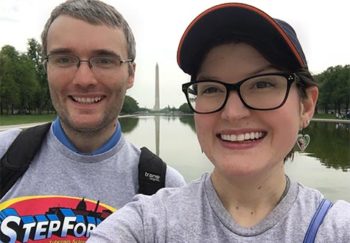Ava Marie is a remarkable little girl. She’s whip-smart and full of energy. You would never know that Ava had almost ¼ of her brain removed. She was a rare, but perfect, candidate for brain surgery as a treatment to stop her many daily seizures. More than a year after her brain surgery, Ava hasn’t had a single seizure.
“What really sticks with me about Ava is that she’s an interesting example of someone going from 20 or more seizures a day to being seizure-free with a surgery. That’s pretty amazing,” says Erika Axeen, MD, a UVA Children’s neurologist who specializes in epilepsy and seizures.
What Causes Ava & Others to Have Epileptic Seizures?
With epilepsy, also called seizure disorder, nerve cell activity in the brain gets disturbed. During a seizure, a person may lose consciousness and start shaking uncontrollably. Epilepsy can be caused by:
- Brain injury
- Tumor
- Stroke
But it often comes from a random “blip” someone is born with — a misspelling in their DNA letters or a defect in their chromosomes, Axeen says.
“It wasn’t until genetic technology advanced over the past 10 to 20 years to the point that we can test our patients in clinic for causes of epilepsy,” she notes.
Ava’s epilepsy and her multiple seizures a day uncovered a rare genetic condition Ava was born with — tuberous sclerosis complex (TSC).
TSC creates abnormal noncancerous tumors in different parts of the body, including the brain. Ava had a cluster of growths, called tubers, on the front part of her brain. They triggered her epileptic seizures.
Ava's Seizures Were Subtle at First
For people with TSC, epileptic seizures are very common. Ava’s seizures started when she was 7 months old. They were subtle. Nothing like the dramatic shaking you may have seen on TV or in movies.
Ava’s mom, Dana Hensley, shares: “As a baby, Ava started doing this thing where she looked constipated. Her body shook but it looked like she was having a bowel movement.”
These subtle seizures went away for a while. But they got more intense when they came back. Her mom shares: “Her eyes did a rapid-movement kind of thing, and her body would shake a little bit. As the seizures got worse, her arms would go out shaking. At first, she was able to walk through them. But then they got to the point where they were knocking her down.”
What Are the Best Seizure Treatments?
For most children, medication can stop seizures. And half of children will outgrow their epilepsy, Axeen notes.
Doctors tried 5 medications with Ava. Nothing helped. And, because of her TSC, Ava was unlikely to outgrow her epilepsy. So Axeen and a team of UVA Children’s and UVA Health experts came up with another plan.
In February 2021, Ava had a 2-part brain surgery for seizures done by neurosurgeon Jeff Elias, MD:
- First, he placed electrodes on her brain to see what parts were faulty.
- A few days later, he removed the faulty part of her brain.
Brain Surgery: Rare But Effective Seizure Treatment
“Everything lined up for Ava for brain surgery to treat her seizures. It’s rare we can get all of those things to line up and to be able to remove it,” Axeen says.
She adds, “It’s not rare for children to respond to their medication or other things we can do to help these children stop having seizures. Most children do not require surgery for seizure treatment. However, in children who do not respond to their anti-seizure medications, it is important that we ask the question 'Is brain surgery an option?'”
More than a year since her brain surgery for epilepsy, Ava shows no problems with her brain function. “I would recommend Dr. Elias to anyone,” Dana says. About to start preschool, “Ava’s a busy 4-year-old now. She’s so smart — beyond smart,” her mom shares. “She picks up everything. And she says words that we don’t even say.”
Back to Being a ‘Normal Girl’ After Brain Surgery for Seizures
Ava is at a higher risk for developing attention deficit and hyperactivity disorder (ADHD) later on, Axeen notes. Otherwise, her brain surgery seizure treatment caused no lasting damage. How is that possible? Two reasons, Axeen says:
- The part removed wasn’t functioning normally anyway.
- The brain, especially a young brain, has an amazing ability to reassign functions to other parts of the brain.
Axeen adds, “Ava’s a bundle of energy and essentially a normal girl.”
Lifelong Care for Kids with a Rare Condition
With highly specialized experts, UVA Children’s and UVA Health have special clinics for people like Ava who are born with a rare condition.
Although her seizure treatment was a success, Ava will need to be followed by a team of doctors her whole life. There is no cure for TSC. Growths could start forming inside her body or on her skin at any time. They could show up on her brain, kidneys, or heart. Medications can help prevent these growths from forming.
Ava is one of about 50 children followed at UVA Health for tuberous sclerosis. At the same clinic visit, a child and their family can not only meet with Axeen, but also with a pediatric kidney or heart expert, or a pediatric developmental specialist. The specialists that they see depends on what part of the body is affected by TSC.
Once a patient grows up, they can transition to adult care for tuberous sclerosis led by Derek Bauer, MD. He brings a unique perspective. He’s not only a neurologist but was diagnosed with TSC at the age of 12.
Highest Level of Epilepsy Care
As a certified level 4 center, UVA Health offers the highest level of seizure treatment, including brain surgery.
Seizures Treated, Keeping a Close Watch
Some children are diagnosed with TSC even before they’re born. Growths on their heart can show up in prenatal ultrasounds.
For Ava, it was her seizures that led to her tuberous sclerosis diagnosis when she was 21 months old. Although TSC can run in families, no one else in Ava's family has it and her mom, Dana, had never heard of TSC. Dana is relieved Ava’s seizure treatment was a success.
She worries, though, that the seizures might pop up again, or that Ava will develop issues from other growths she could develop. But the mom knows she has a whole team watching out for Ava. And they’re just a few minutes away from their Charlottesville home.
“We’ll tackle other issues when they come,” Dana says. “With her seizures gone for now, Ava’s not hurting her body right now, so that’s a blessing.”



I am so proud of Ava Marie my brave little girl. I am also proud of the uva staff that has stood by her side and took the time to research what was the best decision for her well being. They all were so supportive and caring.
Thank you all for helping my baby girl.